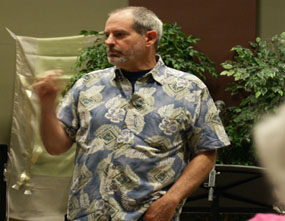I’ve been around the block a few times, and I’ve learned that “conventional wisdom” is often just that, because if something happens enough that people observe and make a “rule of thumb” about it, there is something to it. On the other hand, “the exception proves the rule” just the same. One of the things I’ve seen in print a lot lately, for example, is “whether you think you can or think you can’t, you’re right.”
I’m going to stop the quotes now, and get to the business at hand. I have recently spoken on the state of church music, and, specifically, the choir’s role in worship, at a number of conferences. At times it seems as if I am fighting to make sure the choir survives in the church…not as an institution, although I think that would be a good thing, but rather because the people who are leading choirs often seem to have no clue about what a choir can do. Let me outline three scenarios, and I’ll ask you (there is a comment form below…please use it…thanks) to let me know if any of these seem familiar.
The Choir on Life Support
The singers and director arrive at a rehearsal not knowing how many people will be there, or what the balance of parts will be. The director has long ago given up on singing 4 part music, so the folder is mostly filled with unison songs with generic texts. It seems like all the good singers have drifted away from the group, although they still come on Sunday and sit in the pews, and so the music keeps getting easier each season in order that those who are left can manage it.
During the rehearsal time, the group gets sidetracked more than once: figuring out who might sing a small solo, waiting for the director to find the right cue on the CD accompaniment disc a couple of times, and trying to figure out if everyone who is at rehearsal can be there on Sunday morning are the hot topics this week. The rest of the time the group “just sings” without any attempt by the director to fix problems. Some of the good singers who remain wonder if the director even knows there is a problem. Last week, at the end of rehearsal, several of the singers were talking about how great the choir was when a previous director was here. Four or five years ago all the choir room seats were full, they sang in worship every week, and did interesting music. Now the only ones here are those who really don’t want to see the choir die, and some of them are finding their commitment wavering.
The Choir as Back Up Singers
The singers hurried to get to rehearsal on time because this Sunday was going to be a big deal. They talked about how great it was to be on the worship platform and sing behind such a famous name. The choir director sure knew a lot of great worship leaders, and it was cool to learn the music just like it was on the original recording. But because there were so many singers now, it was crowded and you had to arrive early to navigate your way to your seat. The director was talking about starting a waiting list for people to be in the choir, and the singers didn’t want to lose their place by doing something stupid like being late to rehearsal.
One of the singers showed the other the new book, bought just for tonight’s rehearsal. There was a lot of down time in rehearsal now while the director taught other parts their notes by rote, and so many singers had taken to carrying reading material to not be bored while waiting their turn to learn their parts. This particular group talked about how the waiting list might be a good idea, because it could weed out those who couldn’t learn their parts even while having the rehearsal CD for a whole week ahead. They were a bit smug since they were able to memorize easily, but they hated waiting for the people who had trouble doing so.
They agreed that the best part of rehearsal was during the fellowship time when they had a chance to get an autograph from this week’s guest artist. The best part about Sunday was going home to see the tivo’d broadcast of the service and seeing whether or not they were lucky enough to be in one of the choir shots.
The Choir as Concert Artists
The singers slipped into their seats as the warm-up was already in progress. This week they were spending time extending their top range and working on how to modify their vowels while still staying in tune for the high notes. The director spent some time on an exercise that reminded the basses how to sing in falsetto, and the altos sang along because it was a help for them as well. They were in a seating formation facing each other in two choirs this week because they were doing a movement from the Martin Mass on Sunday. It was gorgeous music, but there was still work to be done tonight because the pitch slipped once in a while over the course of the 8 minutes of a cappella singing. It wasn’t as hard as the Kyrie of the Bruckner E minor mass they had done a couple of months ago, but still…
As the director blew into a pitchpipe to give the starting note and the choir began to sing, you could just feel the combination of excitement, pride, and wonder at the beauty of the music. It would be perfect as an anthem. They all knew that, because they had put in the work, and they always sang great. It helped to have the paid quartet of college students in the choir. Having them there seemed to make learning the hard pieces that much easier, and they sure could sing. And it was worth it, because the congregation always sat back and seemed to be in awe when the choir got up to sing. You could tell that they appreciated how good the music was each week. The church was lucky to have this kind of music on a regular basis. The singers had been talking last week about how wonderful it was going to be to do this music in Europe, on their 5th tour in the last decade. The pre-tour rehearsals were always a difficult slog, because the director insisted upon perfection, but it was worth it to be able to sing in the great cathedrals.
Recognize any of these groups? While the names have been changed, they do exist. I’ve attended these rehearsals. I’m not using these examples to judge. Whether or not you think any of these are the “ideal” choir ministry, the question in the title of this blog asks, do you think small or big? Whatever you think your choir can do, or can’t do, you’re right.
In church music and worship ministry you get what you pay for in most instances, and I’m not just talking about the amount of money spent in salaries. “Paying” here means the amount of preparation, effort, and thought involved in the structure, rehearsal, and other details of the ministry.
I believe that you can tell what is important to a director–how big or how small a director thinks–by seeing it reflected in what the choir (or any ensemble, for that matter) accomplishes on a week-to-week basis. Do you agree? Please leave a comment and let me know what you think.
…
You can follow me on twitter here
Join me on facebook here












{ 2 comments… read them below or add one }
I read some book years ago on not treating your choir like a small group – and instead teaching the people in it to behave like they are in a larger group (including me as a leader). To oversimplify, there need to be several smaller groups within the choir itself. In that way, there is always room for new singers, and your choir is not a closed system. I have seen this work in both smaller churches and larger churches.
Musically, the choir must experience both challenge and success, and the music we purchase must be worth doing more than once. As directors, we need to make sure our skills are up to snuff, and continually evaluate our rehearsal techniques and policies.
All good points, Janice. I’d like to know more about the small/large group thing. This is the first I’ve heard about it, but, on the face of it, it does make sense. Can you tell me more?
vs
You must log in to post a comment.